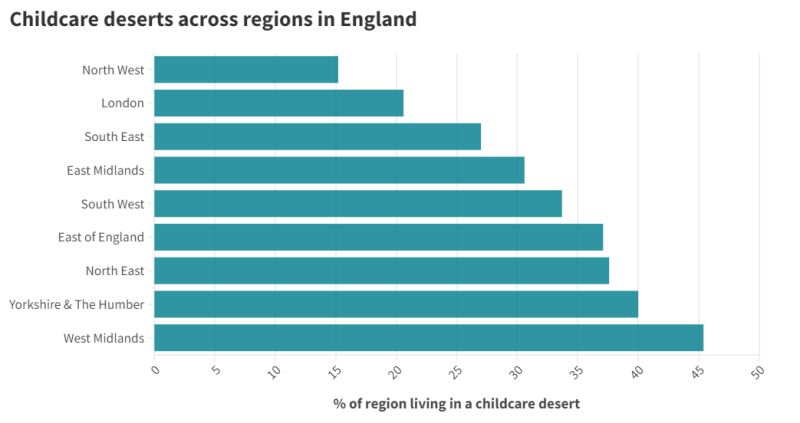NEWS FROM THE SECTOR
"Childcare Desert" - Childcare at an all time low
ITV News recent article calls current early years system a "Childcare Desert"
An estimated 1.5 million children in the UK are currently thought to be living in a childcare desert, where there are more than three children for every available nursery place.
Statistics show that the West Midlands, Yorkshire & The Humber and the North East have the greatest number of people living in a childcare desert.
Peter Hurley, the Associate Professor who authored the report, said: "The disparity within the early learning sector across England tells a story of inequality, with affluent families living in wealthier parts of the country having access to a greater quantity of early year care. It is often the best parts of town that have the highest childcare accessibility."

Research by Victoria University’s Mitchell Institute revealed that ‘45% of centre based childcare and nurseries are classified as a childcare desert.’ To be classified as a "childcare desert" there is a significant lack of nursery places, funding, staff retention and skilled staff. Therefore, a complete transformation of early years provisions must be discussed by the government in order to truly give children the 'best start in life.'
Sarah Ronan, Director of the EECC, said: "Childcare deserts in England are predominantly found in areas of disadvantage, yet these are precisely the communities that would benefit from greater access.” In order for parents to return to work childcare must be secured for families, this issue has been escalated by the unaffordable prices of childcare and nursery places, leaving parents on "survival mode" in an already difficult financial crisis.
'Yes, opportunity begins in the early years, but without fair access to early education, so does inequality. We need a strategy for addressing this coupled with a willingness by government to invest and reform.' A child's first five years of life are instrumental in their development and therefore by inequality in childcare and learning opportunities, some children fall behind in their development. From this early point a child's progression into the educational system will be impacted and will struggle to catch up to peers who have had opportunities for development.
The new Labour government has promised to create more than 100,000 new nursery places by setting up more than 3,300 new nurseries in primary schools.
Education Secretary Bridget Phillipson told ITV News that 'fixing the early years is my number one priority, including delivering our plans for 3,000 school-based nurseries, because high quality early education is so valuable in giving children the best start in life.'
Christian Bunting, Director of Birth to 19 says:
“The economic situation of the early years sector is broken. Keys issues around funding, affordable childcare places and poorly paid PVI nursery practitioners present the government with a need of reform. In order to provide a vital economic foundation within local areas, elected metro mayors must consider the childcare desert at present, as working families want to be ensured their child has a place at a high-quality nursery or children’s centre in order for them to feel comfortable in returning to work. The retention crisis for nursery staff and child carers has knock on effects for children and ultimately families.”
Key demands for the government:
- The government to invest in support for high quality nursery offers, particularly for children between the ages of birth to two years old.
- Upskilling of the sector
Reaping the rewards of working with children simply is not enough for the current economic climate.
Birth to 19, hopes for a near future where the government prioritises the early years sector. Only when the government develop an entirely fresh approach can we hope for inequality to improve and all children to have equal opportunities for learning from birth.
To read the article by ITV, click here.
